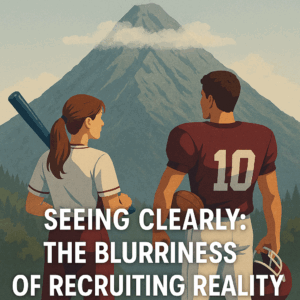“The great danger of the internet is not that people will believe everything, but that they won’t know what to believe at all.” – Unknown
In the world of college recruiting, advice is everywhere—on podcasts, in group chats, and especially across social media. While well-meaning, not all of it applies universally. One of the greatest challenges for student-athletes and their families is learning how to filter that advice and understand which voices are relevant to their journey.
I normally stay quiet in online debates. Social media rarely offers the full context needed for meaningful discussion, and misunderstandings often do more harm than good. But recently, I broke that rule after seeing a respected club coach state, “College coaches all recruit on social media.”
Her comment wasn’t malicious or even necessarily wrong—at least not in her world. She’s a former Division I player and coach who now runs a high-profile club. She has built strong relationships with college programs, and from her perspective, her experience supports her claim.
But here’s the nuance I believe is essential for families to hear: context matters. I had just interviewed five highly accomplished college coaches—all hall of famers or future hall of famers—who shared that they don’t actively recruit on social media. Not because they’re out of touch, but because it’s simply inefficient. As one coach described it, using social media to recruit is like “trying to fish in the ocean with a stick and a worm.” They prefer targeted, relationship-based recruiting approaches that produce more reliable results.
This doesn’t mean social media is irrelevant in the recruiting process. Far from it. Coaches may look up an athlete who reaches out via email. They might evaluate highlights posted by a trusted club director. And yes, occasionally, they may stumble across a prospect while browsing. But in most cases, these moments aren’t random—they’re the result of prior connections, communication, and context.
The takeaway? Social media can be a helpful tool, but it’s not a strategy. A video posted to your feed isn’t likely to go viral among college coaches. What moves the needle is taking ownership: emailing coaches directly, following up with purpose, and using social platforms to reinforce your interest and character—not just to hope someone finds you.
In recruiting, as in life, be careful who you listen to. Seek out advice that applies to your level, your goals, and your specific situation. And always read between the lines—because behind every story of success is usually a story of relationships, intention, and effort that started long before the spotlight ever hit.
Want help finding the right path in your recruiting journey?
Visit coachmattrogers.com for personalized recruiting support, strategic guidance, and free resources.
📘 Pick up a copy of Significant Recruiting: The Playbook for Prospective College Athletes
🗓️ Check out the new The Softball Recruit’s Journal – your weekly roadmap to staying focused, prepared, and in control.
🎙️ And don’t miss the Significant Coaching and Significant Recruiting podcasts for insight straight from today’s top college coaches.
Let’s build your future with purpose—not just hope.






